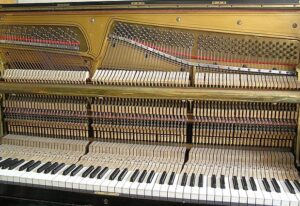Is It OK to Play an Electric Piano?
 It depends. It’s necessary to make a serious distinction between a real acoustic instrument and an electric piano, very popular nowadays. These don’t have much in common, believe me or not. In short – acoustic pianos have soles, and electric ones are just robots, mimicking real creatures. 🙂 They are fun to deal with, but it doesn’t relate to pianism per se.
It depends. It’s necessary to make a serious distinction between a real acoustic instrument and an electric piano, very popular nowadays. These don’t have much in common, believe me or not. In short – acoustic pianos have soles, and electric ones are just robots, mimicking real creatures. 🙂 They are fun to deal with, but it doesn’t relate to pianism per se.The most important part of studying the piano is producing a nice tone, learning to feel your hand and arm from within, developing one’s ear for every tiny detail, while working on touch and control of the fingers – per years! Electric pianos are not suitable for all that; they don’t have the same response, physics, mechanics, and sound palette. Maybe, for a layman it seems not a big deal, but for those, who learnt to notice finer details, it definitely is. These are just different instruments! If I begin to practice every day as a classical pianist on an electric piano with the feel of a “heavy arm”, which I am supposed to have on the acoustic instrument, then, probably, I will damage the keyboard in about a year, or a year and a half. That is why those who practice just on electric instruments can’t play technically demanding compositions on a real piano, especially the one with really heavy action. Their hands and fingers just wouldn‘t develop enough power for the true piano hammers. Think about going to the gym for lifting light plastic imitations of real weights.
So, you just need to realize what is that you really want. Have in mind also that not every professional classical piano teacher would even agree to deal with an electric instrument, although many of us do. If your goal is just to memorize the keys’ names, read the music text and play a bunch of simple tunes, you can buy an electric piano for a fraction of the cost of a good acoustic instrument (although older uprights are becoming cheaper and cheaper). Besides, studying classically is intellectually and physically demanding and, maybe, not even very entertaining at the beginning. However, in spite of this delayed gratification, it develops one’s brain in a way nothing else can do. Working on subtle nuances of the sound of a real piano builds up the ability to recognize more acoustic details and incredibly amplifies one’s ability to retain focus, which is an invaluable quality in our days.
